MercoPress. South Atlantic News Agency
Tag: United Nations Security Council
-
Wednesday, October 22nd 2025 - 09:44 UTC
UK at UN Security Council sponsors recognition of Kosovo’s independence
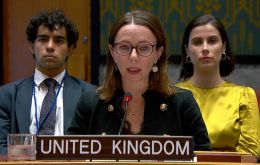
Jennifer MacNaughtan, UK Minister Counsellor, at the Security Council meeting on Kosovo called on other Member States who have not yet done so to join the majority and recognize Kosovo’s independence: Ms MacNaughtan said she would make three points.
-
Tuesday, September 24th 2024 - 20:43 UTC
Lula wants permanent UN Security Council seats for Africa and Latin America
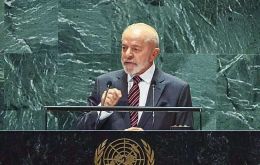
Brazilian President Luiz Inácio Lula da Silva Tuesday opened the 79th United Nations (UN) General Assembly in New York with a speech focused on the Security Council's shortcomings in the face of recent global events and called for a permanent seat on the body for Latin America as well as for Africa while insisting that such an omission was “an unacceptable echo of the domination practices of the colonial past.” Today, only the United States, Russia, China, France, and the United Kingdom are permanent members, and all of them have veto powers.
-
Tuesday, March 26th 2024 - 20:29 UTC
Brazilian FM talks global peace with Russian counterpart
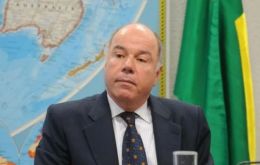
Brazilian Foreign Minister Mauro Vieira held a telephone conversation Tuesday with his Russian colleague Sergei Lavrov during which they reviewed the recent terrorist attack in Moscow and the UN Security Council resolution ordering an immediate ceasefire in Gaza, among other topics. The South American diplomat offered his country's help to cool down the spiraling global tensions.
-
Thursday, February 22nd 2024 - 10:32 UTC
Host Vieira criticizes UNSC on first day of G-20 Foreign Ministers Summit
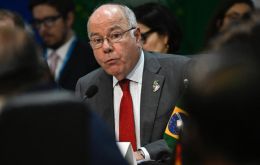
Brazil's Mauro Vieira launched Wednesday the 2-day summit of G-20 Foreign Ministers in Rio de Janeiro by criticizing the paralysis of the United Nations Security Council in the face of the record number of conflicts in the world.
-
Saturday, July 2nd 2022 - 09:53 UTC
Brazil takes over Security Council rotating presidency

Effective Friday, Brazil has taken over the rotating presidency of the United Nations Security Council (UNSC) for the whole month of July.
-
Tuesday, November 28th 2017 - 09:00 UTC
UN asks Brazil for peacekeeping forces in Central African Republic, given their “fantastic job in Haiti”
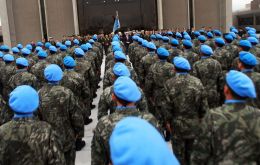
The United Nations has asked Brazil to send troops to join its peace mission in the Central African Republic, said Jean-Pierre Lacroix, the U.N.'s head of peacekeeping operations, in an interview on Monday.
-
Tuesday, November 14th 2017 - 09:02 UTC
Powerful friends boycott UN Security Council meeting on Venezuela; EU approves arms embargo
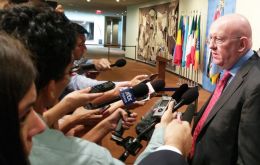
Russia, China, Egypt and Bolivia boycotted an informal public United Nations Security Council meeting on Venezuela on Monday organized by the United States, saying the 15-member body should not be involved in the situation.
-
Wednesday, September 20th 2017 - 08:07 UTC
Temer: “We need more diplomacy, we need the UN more than before”
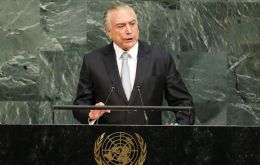
The President of Brazil, the first Head of State traditionally to address the annual United Nations General Assembly’s general debate, pledged on Tuesday that his country will sign the Treaty on the Prohibition of Nuclear Weapons – reiterating that the nuclear powers undertake additional disarmament.
-
Friday, October 7th 2016 - 11:41 UTC
Guterres experience with refugees and Syria, were decisive for his UN nomination
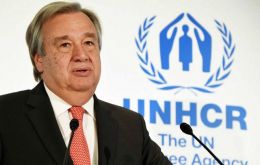
Antonio Guterres from Portugal, unanimously backed by the Security Council, will become the United Nations next secretary general, and is scheduled to assume the office, on the 38th floor of the U.N. building in New York City, on Jan. 1, 2017. His ascendance came at a time when expectations were high that the U.N. might elect either a woman or an Eastern European to the position, neither of which has happened before.
-
Thursday, February 4th 2016 - 07:59 UTC
Santos at the White House will ask for help to implement Colombia's peace accord
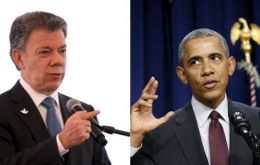
Colombia's President Juan Manuel Santos has said he will ask President Obama to help implement a peace accord that his government expects to sign with the Farc rebel group next month. The two presidents will meet at the White House on Thursday.
